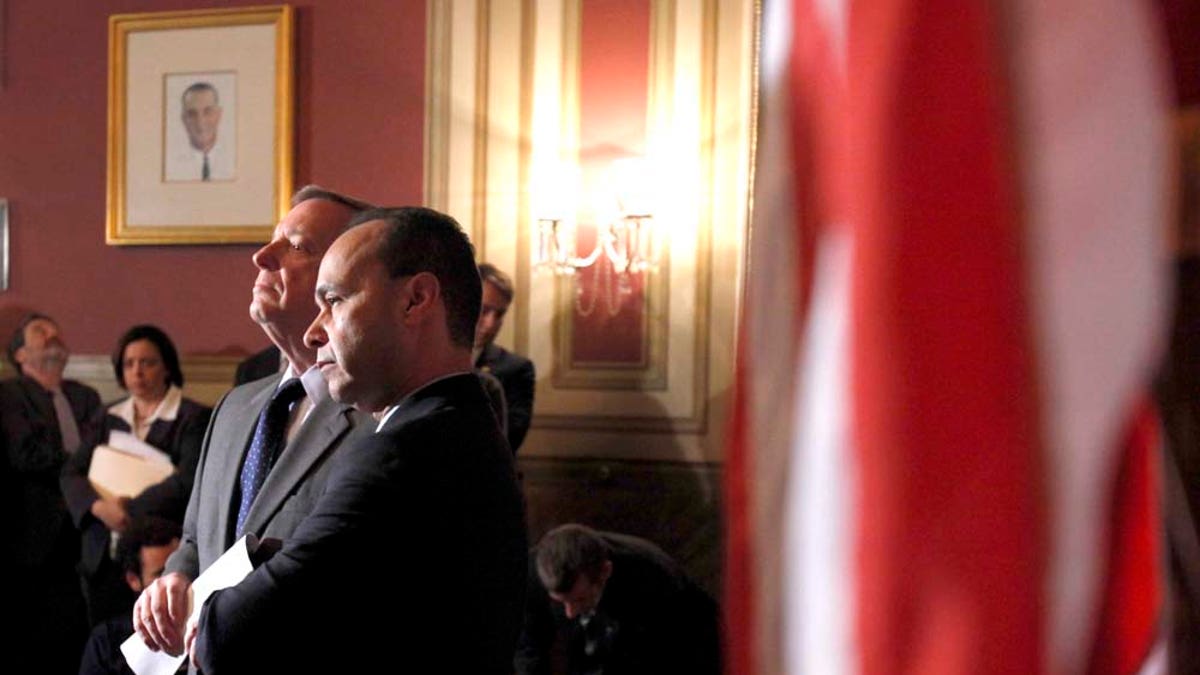
Senate Majority Whip Richard Durbin of Ill., left, Rep. Luis Gutierrez, D-Ill., look on during a news conference on Capitol Hill in Washington, Wednesday, Dec. 8, 2010, to discuss the Dream Act legislation. (AP Photo/Harry Hamburg)
Democrats have delayed a showdown vote on legislation carving out a path to legal status for foreign-born youngsters who were brought to this country illegally, or entered legally with their parents on a visa then overstayed.
Facing GOP objections, Democrats are putting aside the Dream Act. They're short of the 60 votes needed to advance the measure.
DREAM Act supporters say they're busy reaching out to Senate members to drum up support for the bill.
"We're reaching out to all offices in the Senate," said James Ferg-Cadima, the regional counsel for the Mexican American Legal and Education Fund, or MALDEF, in Washington, D.C. "Directly and indirectly, MALDEF continues to lobby in support of the DREAM Act."
Democratic officials say they'll try to move a House-passed version after the Senate acts on funding the government and extending tax cuts. Republicans have said they won't agree to consider anything else until those issues are addressed.
The bill grants hundreds of thousands of undocumented immigrants brought to the United States as children a chance to gain legal status if they enroll in college or join the military.
The House of Representatives approved a bill that would grant thousands of young undocumented immigrants the chance to become American citizens Wednesday night.
The bill now needs 60 votes in the Senate, where it is expected to be brought up for a vote on Monday.
The bill is aimed at hundreds of thousands of young undocumented immigrants brought to the U.S. before the age of 16, who have been in the country for five years and graduated from high school or gained an equivalency degree. They would get conditional legal status -- which would allow them to obtain work permits and driver's licenses, as well as be able to apply for college loans. They would have a chance to gain permanent legal status -- or the "green card" -- if they joined the military or attended college.
The DREAM Act is a top priority of Democrats and politically active Hispanic groups, who call it a crucial down payment on a broader immigration overhaul.
"This is home for these kids," said Diana Mejia, founder of Wind of the Spirit, a New Jersey-based organization that assists immigrants and advocates for a pathway to legalization for the undocumented. "When people say they should go back home, this is their real homeland because this is where they grew up, this is the only country they really know."
Critics call the measure backdoor amnesty for lawbreakers.
"These children were put at risk by their parents who chose to disobey the laws of our country," said Ron Bass, founder of United Patriots of America, which favors tougher enforcement of immigration laws. "An amnesty was given to illegals in the 1980's by Ronald Reagan. We were promised enforcement and no more amnesties. That never happened."
"What about all the folks who came here legally and followed the laws of our country," Bass said. "We are a nation of laws. My message to all illegal aliens: Go home and follow the rules."
President Barack Obama's team has made an intense public push for the bill, under pressure from Hispanic activists angry that the White House has not pressed harder for a broad immigration overhaul to give several million illegal immigrants a shot at legal status.
In recent days, the administration dispatched officials from the departments of Defense, Homeland Security, Commerce and Education to argue vociferously in public that the legislation would boost national security, competitiveness and economic growth.
Hispanic activists have described the DREAM Act as the least Congress can do on the issue. It targets the most sympathetic of the millions of undocumented people — those brought to the United States as children, who in many cases consider themselves American, speak English and have no ties to or family living in their native countries.
Estimates differ widely as to how many young people would be eligible for some sort of legal status under the measure. The Congressional Budget Office has estimated that one version of the bill that applies to immigrants aged 35 and under would let more than 1 million apply for legal status over the next 10 years, and potentially allow 500,000 to receive it.
A newer version of the bill changed to improve its chances only applies to those under 30, which supporters say would limit it to 300,000 or so.
GOP opponents in the Senate circulated a memo calling the measure "mass amnesty," noting that the bill has no cap or end-date. They contend it could allow even the most dangerous criminals and terrorists to gain legal status.
Those afforded legal status under the bill would, however, have to undergo the same background check as any immigrant seeking legal residency.
"These are not the individuals that are threats to our public safety or to our security," said Homeland Security Secretary Janet Napolitano.
Based on reporting by the Associated Press.




